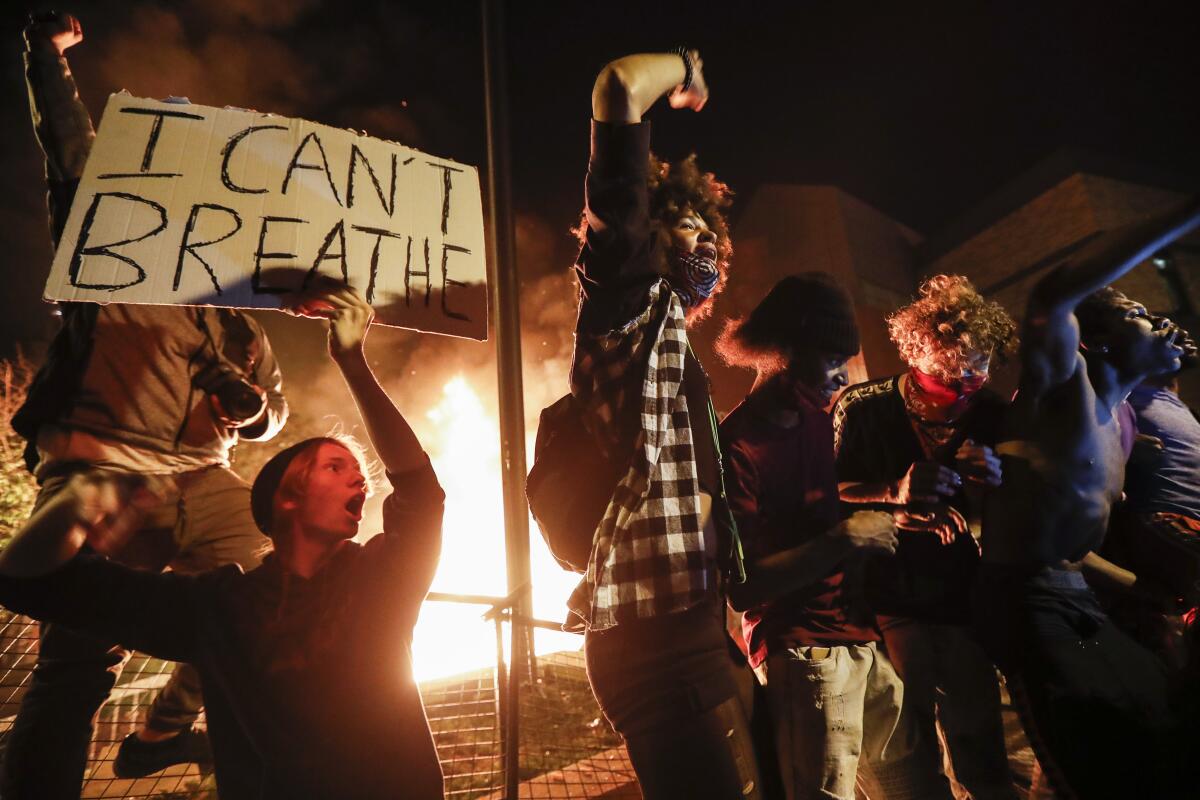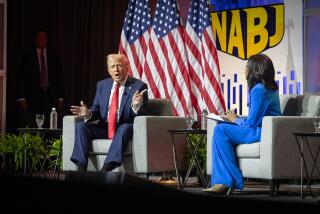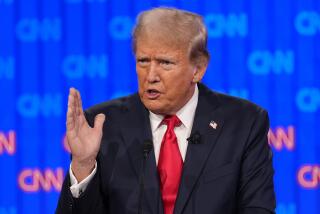Column: The burden of ending racism sits squarely on the shoulders of white people

Donald Trump should just, finally, put a sock in it.
Laura Ingraham should too.
Anyone — anyone! — who defends how police in Minneapolis have behaved this week, or how the white lady walking her dog in Central Park behaved when asked to use her leash — should just stop talking.
America is in crisis right now.
The country is in an economic meltdown. An unchecked pandemic is disproportionately killing black people, while a coterie of right-wing whites, quick to imagine their liberties are being “infringed,” are waging war against science and common decency. This is white privilege at its most insidious.
All of this comes at a moment when the country is more than three years into the presidency of Trump, a bigot who uses racial discord not just as a campaign strategy but as a governing technique.
On Friday, as if on cue, Trump used the word “thugs” to describe enraged protesters who took to the streets of Minneapolis after George Floyd, yet another unarmed African American man, was choked to death by a white police officer, as three of his colleagues stood by.
“These THUGS are dishonoring the memory of George Floyd, and I won’t let that happen. When the looting starts, the shooting starts,” tweeted Trump, never one to refrain from throwing gasoline on a racial fire.
That officer’s knee on Floyd’s neck is as good a metaphor as any for the way this country — and our current president — deal with racial inequality.
On Thursday night, Ingraham concluded her monologue with an almost otherworldly display of white cluelessness: “And to our African American fellow citizens, I say this: Given his own experience with an out-of-control FBI and unfair investigation, given all the work on criminal justice reform, President Trump knows how poisonous and out-of-control law enforcement process can be.”
Anyone who agrees with that sentiment?
Please put a sock in it.
::
Listen, I know you are not a racist.
I am not talking about individuals. I am talking about systems.
I am talking about systems of privilege that allow white people to move through the world far more easily than others; to buy homes where they choose, to vote without hassle, to pay less for cars and insurance, to get lower interest rates on home mortgages.
I’m talking about the Supreme Court deciding in 2013 that portions of the Voting Rights Act no longer applied, because, in the court majority’s stunningly naive opinion, it was “based on 40-year-old facts having no logical relationship to the present day.”
Oh, really?
By 2018, nearly 1,000 American polling places in predominantly African American counties had been closed. Early voting was pared back, strict voter ID laws were imposed, voter rolls were purged. All of this was accomplished by Republican legislators.
You understand now why Trump is constantly tweeting preposterous lies about voting by mail, right?
I could go on, but mostly, I am talking about the inexorable toll that our country’s founding sin — slavery — continues to take on the present.
I am talking about how, any time I have been pulled over by a cop, I do not worry about getting lit up, arrested, brutalized or killed. I don’t worry about my kids, either.
This is white privilege.
I have done nothing to earn it. It simply is. I started life with an advantage, and the benefits have kept accruing.
“The subject is extremely difficult to talk about because many white people don’t feel powerful or as if they have privileges others do not,” wrote Francis E. Kendall, a consultant who focuses on organizational change, diversity and white privilege. “It is sort of like asking a fish to notice water or birds to discuss air.”
White privilege is the thing that must not be named or acknowledged by the white conservative power structure that prioritizes transforming the federal judiciary into a subsidiary of American corporations and is happy to shred the social safety net to lower the taxes of the rich.
White privilege is the invisible tie that binds millions of white people who harbor deep feelings of racial insecurity, who let their fears guide them to vote for a carnival barker whose mission is to systematically dismantle not just the achievements of the Obama administration, but the entire infrastructure of government and the rule of law to boot.
“Certainly not every Trump voter is a white supremacist, just as not every white person in the Jim Crow South was a white supremacist,” wrote the Atlantic’s Ta-Nehisi Coates in a 2017 essay on Trump titled “The First White President.”
“But every Trump voter felt it acceptable to hand the fate of the country over to one.”
::
In the age of Trump, the phrase “racial dog whistle” no longer applies.
“It’s a bullhorn now,” said Marc Morial, president and CEO of the National Urban League, one of the country’s oldest and largest civil rights organizations. “He’s unvarnished, uncut. There is no question that a climate of division, white supremacy and hatred has permeated the land. People are absolutely fed up.”
On the phone Thursday, we spoke about how the events of the past week have, once again, laid bare an uncomfortable truth for many white Americans, and how it is incumbent on them to work for racial justice.
“Black people alone can’t reform white racism,” said Morial, who was mayor of New Orleans from 1994 to 2002, and spearheaded a raft of police reforms. “It takes white people to do it. Where black people are not is in all-white conversations, when the question of race comes up. Usually, it comes up when someone says something offensive because people think they are in safe company. It’s in that moment that white people have to fight back. That is so critically important.”
The question looming over white Americans right now is the same question that has loomed over us since the birth of this country: How can we help make things right for black Americans?
A good start would be to drive Trump back to his gilded perch at Mar-a-Lago.
We can all do that on Nov. 3.
More to Read
A cure for the common opinion
Get thought-provoking perspectives with our weekly newsletter.
You may occasionally receive promotional content from the Los Angeles Times.











